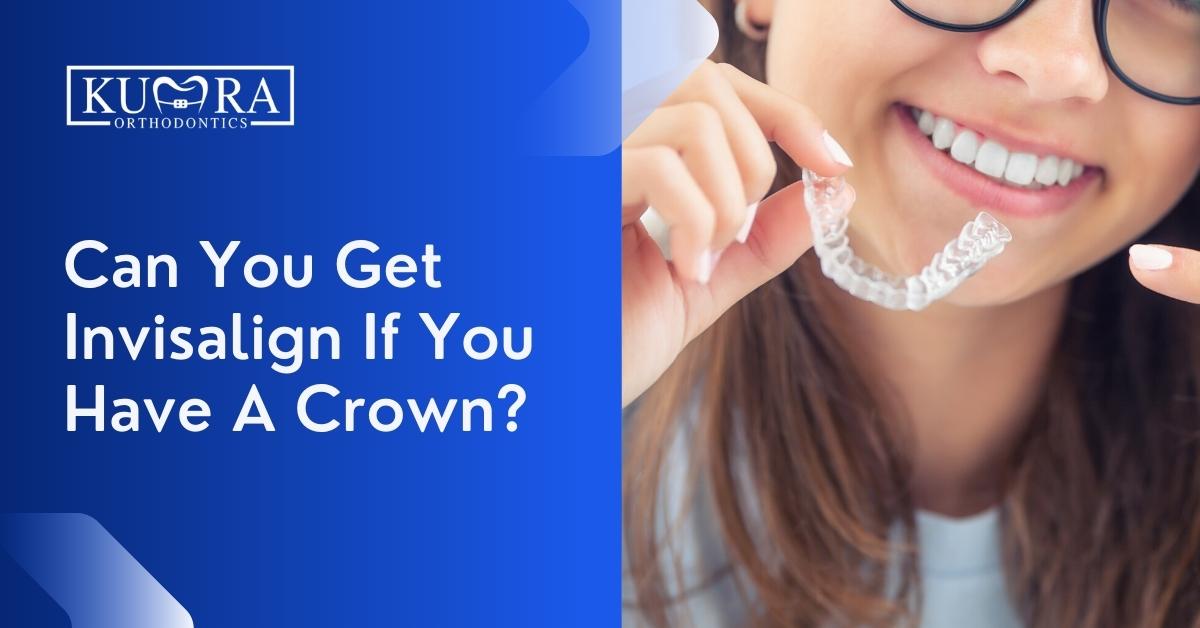Invisalign treatment is excellent for those with mild to moderate misalignment who desire improved teeth and jaw alignment. Compared to other popular solutions, such as metal braces, Invisalign is an excellent option for those who may feel self-conscious wearing extremely visible braces. It is important to consult an orthodontist when deciding whether Invisalign is recommended for a patient.
One common question Invisalign patients often have is if they can get it even if they have a crown. The answer is yes, but there are some things you need to know first. In this post, we’ll explain what you need to consider before getting Invisalign if you have a crown. Keep reading to learn more!
What are Dental Crowns?
Teeth can become weakened over time. This can occur for many causes, including dental decay, traumas, and wear and tear. Teeth can lose their size and form. Teeth are covered with crowns, which are tooth-shaped caps. Consider it a tight cap for your teeth. The crown restores the form, size, strength, and aesthetics of the tooth.
Dental crowns are cemented onto teeth, covering the tooth’s visible area.
Because dental crowns are not connected to the jawbone, teeth with crowns are just as movable as teeth without crowns.
Invisalign with Crowns
Crowns do not exclude patients from Invisalign treatment. Straightening teeth with crowns differs little, if at all, from straightening natural teeth. However, when an attachment is glued to the tooth, the crowns may present a greater issue. An attachment is a tiny, tooth-colored dental device occasionally put on the tooth’s surface to facilitate the Invisalign procedure. Orthodontists are proficient at installing them, regardless of whether the patient has dental crowns. This is often not a problem.
People with crowns can straighten their teeth more effectively with Invisalign than traditional braces. This is because orthodontic brackets must be glued to every tooth, including those with crowns.
Although this is possible, the bonding substance does not always attach to crowns as effectively as normal teeth. This means that crown-covered teeth are more likely to have loose brackets. It is possible to harm the crown when the brackets are removed, and if the crown is substantially damaged, you may require a replacement.
In contrast, Invisalign aligners need not be bonded to each tooth. This implies that if you have crowns on your front teeth or a few teeth, there’s a strong possibility they won’t require any attachments or buttons.
In addition, patients are always reminded that oral health is significant to combat tooth decay, infection, or disease that may hinder their orthodontic treatment.
Related: A Comprehensive Guide to Invisalign Attachments
Needing an orthodontic appointment?
Visit Kumra Orthodontics Washington, DC or Kumra Orthodontics Stafford, VA, and request an appointment with us!
Crown or Invisalign First?
If you require crowns and wish to have your teeth straightened, you may ask whether you should have the crowns first. The decision relies on why the crown is required. If the crown is intended to conceal chipping or discoloration, it may be better to wait until the teeth have been straightened. If your tooth is significantly decaying or broken, and a crown is required for structural support, you should obtain your crown first.
What are Invisalign Limitations?
Although Invisalign can correct several bite problems, it does not always have the same capabilities as traditional braces. Many of our patients are curious about the limitations of Invisalign.
Here are some:
- Severe overbite
- Shape of teeth
- Tooth position
- Large gaps
- Intrusion and extrusion
- Prior dental work
Frequently Asked Questions
Does Invisalign work with other restorations?
Yes. Invisalign can be successfully combined with other restorations, such as dental crowns. If you are considering Invisalign and already have other dental work, such as dental veneers, we would be happy to provide a complimentary consultation to see if you are a good candidate for the treatment.
However, it’s important to remember that not all dental cases are ideal for Invisalign. If you have a significant alignment issue requiring extensive tooth movement, Invisalign may not be the best option for you.
At our office, we have extensive experience with Invisalign and have seen great results in many patients who have elected to undergo treatment. We believe that Invisalign is a great option for those looking for an alternative to traditional braces. We are confident in our ability to help you achieve the beautiful smile you deserve.
Will Invisalign pull my crown off?
There is no need to worry about Invisalign damaging your crown. The aligners are not bonded to your crown and will not pull it off. Additionally, Invisalign is designed to be gentle on teeth, so you can rest assured that your crown will be safe during treatment.
What teeth cannot get Invisalign?
The decision of whether or not to use Invisalign for orthodontic treatment is made on a case-by-case basis by the orthodontist. Your orthodontist may recommend metal braces instead of Invisalign for patients with a severe overbite. This is because metal braces can provide more specific and targeted results for correcting this type of dental issue.
Read more: Can Invisalign Cause Allergic Reactions?
Consult with Kumra Orthodontics to learn more about Invisalign with crowns
If you are considering Invisalign treatment, consult with your orthodontist about the possibility of using dental crowns. Crowns can often be used with Invisalign to correct more severe misalignment and bite problems. Consult an orthodontist in Washington, DC and Stafford VA like Dr. Kumra to learn more. At Kumra Orthodontics, we are happy to answer any questions you may have about Invisalign with crowns – contact us today for a consultation, and let us create your Invisalign treatment plan.



